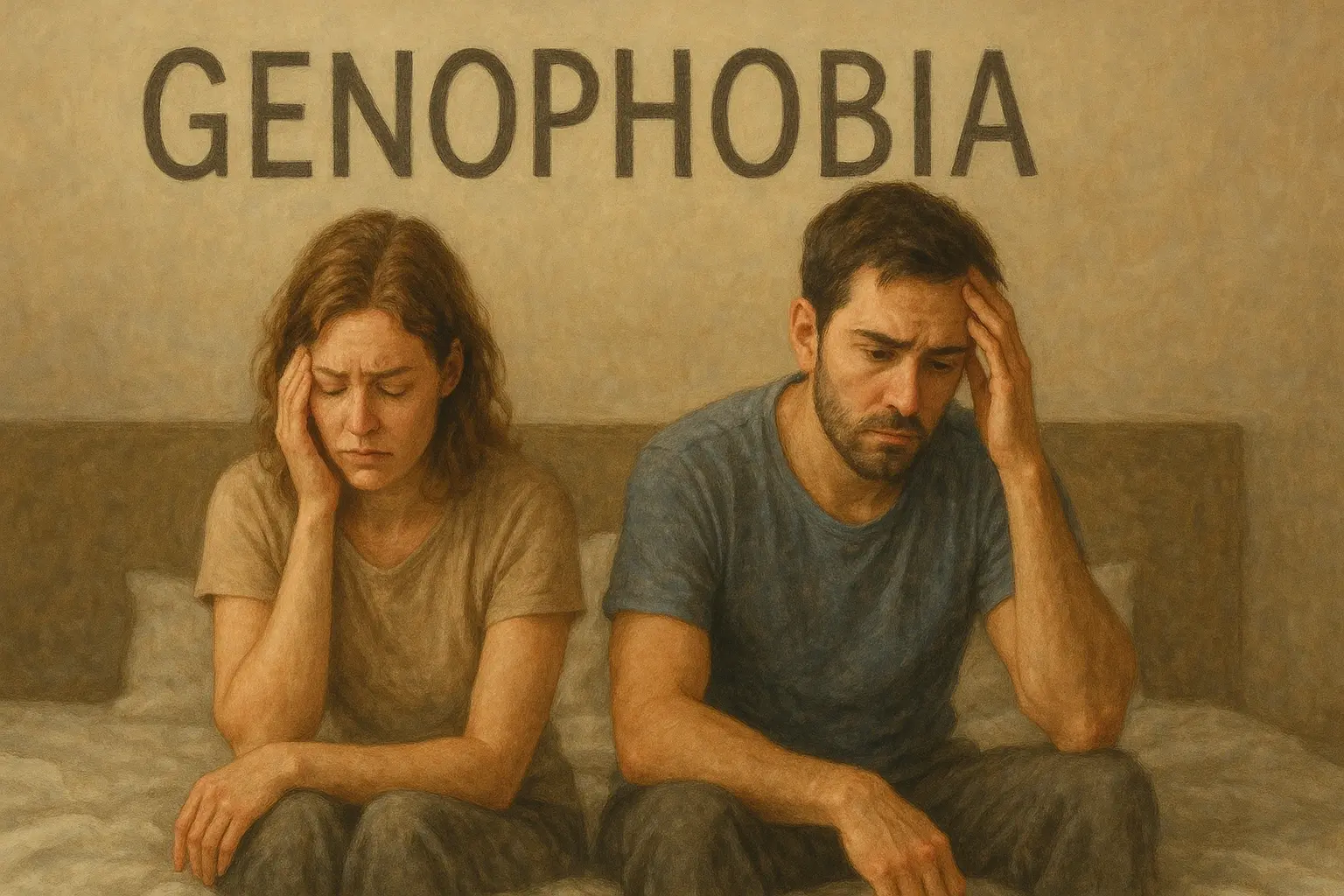
Genophobia (Fear of Sex) in Bangladesh: Symptoms, Causes & Psychological Impact
Genophobia, also called coitophobia, is a psychological condition marked by an intense fear of sexual intercourse. It can affect relationships, confidence, and overall emotional well-being. Though not listed as a separate disorder in the DSM-5 (Diagnostic and Statistical Manual of Mental Disorders), it fits under specific phobias—conditions involving strong, irrational fear toward certain situations or triggers.
In Bangladesh, genophobia often remains unnoticed due to cultural stigma and the lack of open discussion about sexual health. It may appear on its own or alongside PTSD, depression, or anxiety disorders, and is sometimes linked to past trauma or distressing intimate experiences.
What Is Genophobia?
Genophobia involves a deep, disproportionate fear of sexual activity or physical intimacy. The anxiety goes beyond normal hesitation—it can lead to complete avoidance of sexual contact or romantic relationships. Erotophobia, a related term, describes a broader fear of sexual intimacy or sexual topics.
In Bangladesh, limited sex education, social expectations, and emotional pressure within relationships can heighten this fear. It’s not a sign of weakness but a mental-health concern that needs empathy and professional care.
Symptoms of Genophobia
Symptoms vary in intensity but often appear when intimacy feels imminent. Physical signs may include:
- Rapid heartbeat
- Trembling or shaking
- Shortness of breath
- Nausea or dizziness
- Excessive sweating
Emotional and behavioral signs can include:
- Panic or intense fear before or during sex
- Avoiding romantic or intimate situations
- Feelings of shame, guilt, or embarrassment
- Anxiety or sadness from relationship stress
- Fear of nudity or being physically exposed
- Performance anxiety or loss of confidence
- Making excuses to avoid sex
- Becoming less approachable or attractive
- Freezing or feeling paralyzed during contact
In Bangladesh, these signs are often mistaken for disinterest rather than recognized as a psychological phobia that can be treated.
Genophobia and Sexual Dysfunction
Genophobia may overlap with sexual dysfunction, especially when linked to trauma or negative past experiences. Survivors of sexual abuse can develop both emotional fear and physical reactions during intimacy.
Common related conditions include:
- Erectile dysfunction (ED) in men, often tied to anxiety or past trauma.
- Vaginismus in women, where vaginal muscles tighten involuntarily during penetration due to fear or tension.
Because of social silence around sexual health in Bangladesh, many people live with these problems without seeking help. Early counseling and therapy can rebuild safety, trust, and confidence in intimate relationships.
Note for Bangladesh
Fear of sex isn’t abnormal or shameful. It’s a real, treatable condition. If you or your partner experience persistent fear or anxiety about intimacy, consult a psychologist, psychiatrist, or sex therapist. Professional guidance, combined with empathy and communication, can make recovery possible.
Causes of Genophobia
There’s no single reason why genophobia develops. It usually arises from a mix of psychological, emotional, and social factors. Studies suggest that 3–15% of people worldwide experience specific phobias, often starting in midlife. In Bangladesh, where open discussion about sexual health is still limited, genophobia often stems from cultural pressure, trauma, or lack of accurate information.
Past Trauma
A history of sexual abuse or assault is one of the strongest causes. The mind may develop fear as a protective reaction to painful memories. Recovery takes time, but therapy or counseling can help rebuild trust and reduce fear linked to intimacy.
Cultural and Religious Influences
Strict or conservative views on sex can create guilt or shame, especially when intimacy is seen as forbidden. In Bangladesh, such beliefs and limited dialogue often reinforce anxiety around sexual activity.
Negative Sexual Experiences
Painful or embarrassing sexual encounters—physical discomfort, rejection, or misunderstanding—can leave lasting fear. Without communication or reassurance, these memories may grow into avoidance.
Mental Health Conditions
People with anxiety, depression, or post-traumatic stress are more likely to develop phobias like genophobia. Emotional distress can heighten fear of closeness and loss of control.
Lack of Sexual Education
In Bangladesh, poor sex education and misinformation about consent or performance often create unrealistic expectations. Clear understanding helps reduce anxiety and improves confidence in relationships.
Body Image and Self-Perception
Low self-esteem or discomfort with one’s body can make intimacy feel intimidating. Combined with cultural pressure, this may turn into a persistent fear of sex.
Risk Factors for Genophobia
Anyone can develop genophobia, but certain factors increase the risk:
- Gender: Women are more prone to phobias and more likely to face sexual trauma.
- Age: Phobias may begin in youth and peak in midlife.
- Abuse history: Early physical or sexual abuse strongly raises vulnerability.
- Mental health: Depression, anxiety, or PTSD can intensify fear-based reactions.
Diagnosing Genophobia
Diagnosis requires a private consultation with a psychologist or psychiatrist. The evaluation reviews emotional history, past experiences, and daily impact. To meet criteria for a specific phobia under the DSM-5, the following must apply:
- Persistent, intense fear or anxiety about sexual activity.
- Sexual situations consistently trigger fear or panic.
- Sex is avoided or endured with marked distress.
- The fear is disproportionate to real risk.
- Symptoms last six months or longer.
- The fear disrupts social or personal life.
- The symptoms aren’t explained by another disorder.
Note for Bangladesh
Genophobia isn’t weakness or loss of desire—it’s a genuine psychological condition. In Bangladesh, confidential counseling and therapy are available through mental-health professionals. Seeking help early can restore comfort, trust, and a healthy sense of intimacy.
Treatment of Genophobia
Recovering from genophobia takes patience and the right kind of help. There isn’t a single cure, but most people improve through a combination of therapy, counseling, and sometimes medication. In Bangladesh, consulting a psychologist, psychiatrist, or certified sex therapist is often the best first step toward recovery.
Cognitive Behavioral Therapy (CBT)
CBT is one of the most effective approaches for treating phobias. It helps identify negative thought patterns and replace them with more balanced, realistic views about intimacy.
During therapy, you may:
- Discuss how your fear began and set clear recovery goals
- Learn how phobias form and how CBT helps manage them
- Challenge unhelpful thoughts about intimacy or self-image
- Gradually rebuild comfort through exposure therapy
- Practice relaxation and breathing techniques to control anxiety
Exposure therapy, a key part of CBT, works by slowly facing the fear in safe, guided steps until it becomes manageable. While studies on genophobia are limited, clinical evidence shows CBT helps many people regain emotional confidence and control.
Medications
There are no specific drugs for genophobia, but doctors sometimes prescribe antidepressants or anti-anxiety medicine to ease panic or tension. In Bangladesh, these should only be used under medical supervision. Self-medicating can cause side effects or delay real progress.
Sex Therapy
Sex therapy helps individuals or couples rebuild trust, intimacy, and open communication. Guided by a trained therapist, it focuses on emotional understanding and practical ways to reconnect. In Bangladesh, qualified therapists and discreet online services provide confidential support for both partners.
Emerging and Supportive Therapies
Newer treatments are also showing promise:
- Virtual therapy: Controlled digital environments help reduce fear responses.
- EMDR (Eye Movement Desensitization and Reprocessing): Used for trauma recovery, it helps reprocess painful memories through guided focus.
- Hypnotherapy: Promotes relaxation and reduces anxiety, though results vary by person.
Prevention of Genophobia
Phobias often develop from emotional trauma, so full prevention isn’t always possible. Still, early awareness and healthy communication can make a big difference.
Helpful steps include:
- Open communication: Avoiding intimacy may create distance. Talking honestly with a partner can ease pressure and build understanding.
- Seek help early: Speaking to a therapist or counselor can prevent fear from worsening and make recovery easier.
Note for Bangladesh
Genophobia is more common than many realize, and it’s treatable. In Bangladesh, cultural silence often stops people from seeking help, but confidential counseling and therapy are available. With professional support and patience, it’s possible to overcome fear and rebuild a healthy, trusting relationship with intimacy.




